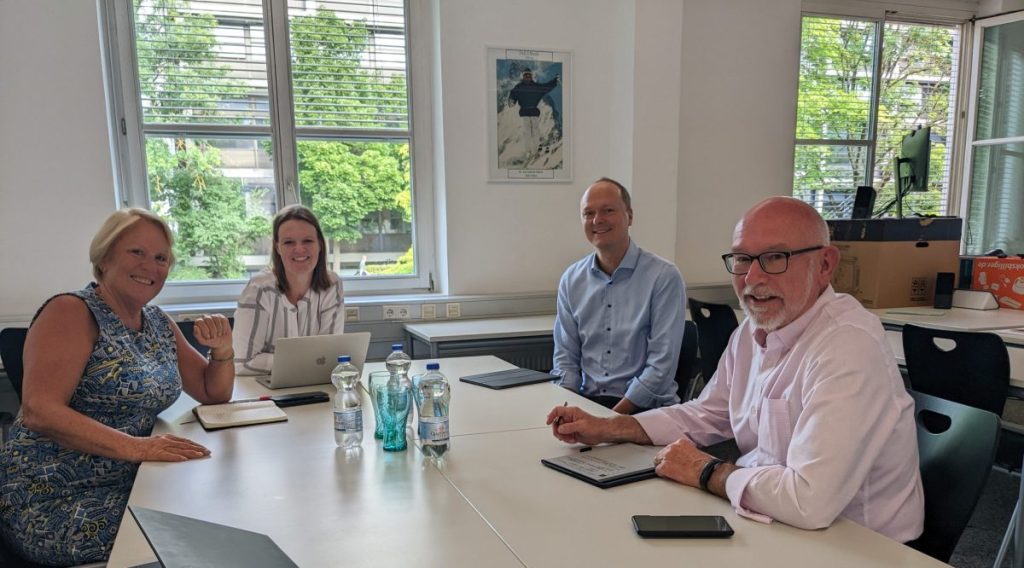
UNC-Chapel Hill is deepening inroads with its longtime strategic partner Eberhard Karls Universität Tübingen in Germany as the two universities jointly pursue how to best use academic partnerships to address global challenges.
Prior to the start of the fall semester, Barbara Stephenson, vice provost for global affairs, led a strategic partner visit to Tübingen. This visit was scheduled to coincide with the 2022 Royster Global Conference, which was organized by Royster Distinguished Professor Tori Ekstrand from the UNC Hussman School of Journalism and Media. The conference brought together a group of Carolina faculty, staff and graduate students with peers from Tübingen University and King’s College London to discuss the global challenge of countering misinformation and restoring public trust in research.
As part of this visit, Stephenson invited Stan Ahalt, inaugural dean of the School of Data Science & Society to join.
“Tübingen is a German University of Excellence and a leader in machine learning and data science,” said Stephenson. “And we spotted an opportunity to connect Dr. Ahalt with experts not only in data science research but administrators of data science programs and graduate students with interests related to data science as part of the Royster Conference.”
Ahalt joined conference sessions and attended meetings with Stephenson and Tübingen leadership to discuss their efforts on data science. According to Ahalt, he found inspiration in Tübingen’s approach that he plans to implement in Chapel Hill, and the student discussions have already informed his thinking as he prepares for the 2023 launch of the School of Data Science & Society.
“In many ways it was the perfect trip to take at just the right time,” said Ahalt.
Over the past year, while international travel was limited due to the pandemic, Carolina and Tübingen held a series of virtual meetings between university leaders, research offices and faculty to keep the relationship strong. Participants explored shared academic strengths and goals, and through these conversations, teams from both institutions hypothesized that they could have greater impact by working together.
“Around the world Carolina is known for being good at collaboration, a place where researchers can reach across silos and come together on work that benefits society,” said Stephenson. “Our partners at Tubingen share that core value, as manifested in the cluster of excellence focused on machine learning, and this visit reinforced a commitment to closer collaboration to solve global challenges.”
Carolina and Tübingen are incentivizing joint research projects through a newly created seed fund. Together the Office of the Vice Provost for Global Affairs (OVPGA) and UNC Research have established a fund with Tübingen to support interdisciplinary collaborations in the fields of data science and health, data science and democracy, and data science and urban planning. The OVPGA is currently accepting applications for funding on a rolling basis.
The first project funded through this collaborative effort is led by three Carolina faculty members and a faculty member from Tübingen. Tori Ekstrand from the UNC Hussman School of Journalism and Media, Priscilla Layne from the Department of Germanic & Slavic Languages & Literatures, and Francesca Tripodi from the School of Information and Library Science, are partnering with Guido Zurstiege from Tübingen’s Institute for Media Studies for their project, “The Weaponization of Intellectual Thought.”
Scholars from across multiple disciplines and both institutions will gather in Tübingen next summer for a workshop to discuss how to study the weaponization of intellectual thought and its impact on democratic processes. Following the workshop, the group will begin gathering data and will collectively seek funding for further joint research initiatives.
The OVPGA will continue to support faculty interested in collaborating with Carolina’s international partners to address global challenges. As part of this experience at Tübingen, Ahalt will be able to apply what he’s learned to address global challenges through the School of Data Science & Society.
“Global challenges, like climate change and health as an example, are going to require international dialogue,” said Ahalt. “What we need to do from a scholarly perspective is to be able to motivate our networks of scientists, humanists, researchers and have a dialogue that persists long enough that we can actually solve problems.”
This visit not only paved the way for new ideas and new global collaborations. It also led Ahalt to deepen his appreciation for the Carolina community.
“This experience makes me more and more proud to be part of this wonderful University.”
For more information about Carolina’s collaboration with Tübingen and to inquire about joint seed funding, contact Melissa McMurray (melissa_mcmurray@unc.edu), OVPGA associate director of global partnerships.

